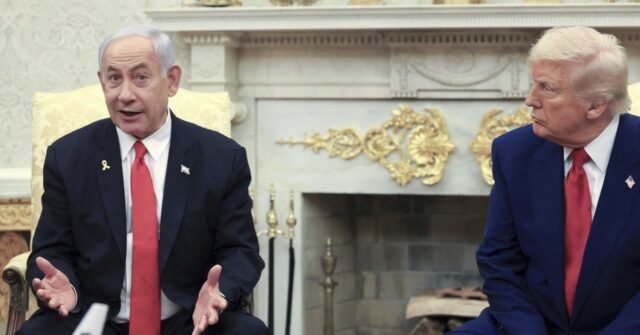Israeli Prime Minister Benjamin Netanyahu is notorious, at least locally, for avoiding conflict. Despite what his international critics, and Israel’s enemies, say, he is no “warmonger”; in fact, many Israelis fault him for avoiding war until it is inevitable, as was the case after October 7.
But Netanyahu is reaching the point where he will attack Iran’s nuclear sides — and, ironically, it is President Donald Trump who is pushing him there.
That might seem odd, given that Trump has been more supportive of Israel than any other U.S. president.
Since returning to office, Trump has undone President Joe Biden’s destructive policies, most recently ending the Office of Palestinian Affairs, which was run by the Biden administration as a sort of parallel diplomatic arm, and which had the audacity to tell Israel to “refrain from violence and retaliatory attacks” after October 7. Trump has also restored weapons supplies to Israel, and canceled Biden’s sanctions on Israeli settlers.
But Trump is now pursuing a new nuclear deal with Iran, and early reports suggest that it will have many, if not all, of the same features that made President Barack Obama’s Iran deal such a failure.
The reports suggest Iran might keep its nuclear enrichment infrastructure, after supposedly stopping enrichment. There are also no clear agreements yet to stop Iranian sponsorship of foreign terror groups, or its ballistic missile program.
Like the first Iran deal, the new negotiations seems to lack any human rights component, which means that the West will have little leverage to open up Iran politically, as the West did with the Soviet Union.
And in the interim between the two deals, Iran has had several years to enrich uranium, which it began to do in earnest once Biden took office in 2021. It is closer to a nuclear weapon, after attacking Israel directly last year.
Netanyahu recently said that no deal would be a better option than a bad deal. Meanwhile, Trump reportedly has grown frustrated with him, and is prepared to act without his cooperation.
But the feeling is mutual.
Netanyahu has been recalling, in public, the many times that Israel acted on its own, regardless of who was in the White House, to protect its interests. He is clearly setting the stage for Israel to strike Iran unilaterally.
Israel believes that the West has unparalleled leverage over the Iranian regime. Since Iran launched two massive ballistic missile attacks against Israel last year, the Israeli military has destroyed most of Iran’s air defenses. There is literally nothing the regime can do to stop an air attack.
Moreover, Trump’s return to sanctions and “maximum pressure” have put major stress on Iran’s economy and the regime’s stability.
Iran once counted on its terrorist proxies, especially Hezbollah in Lebanon, to provide a deterrent against any attack on its nuclear facilities. But Hezbollah has been decimated; Hamas has largely been destroyed in Gaza; the pro-Iran regime in Syria has been overthrown; and the distant Houthi rebels in Yemen have lost their port and their main airport in the past several days.
The Iranian regime is in no position to refuse any deal.
And yet the Trump administration is sending mixed signals. President Trump has said that he will lead the attack on Iran if talks fail, and that he holds Iran ultimately responsible for any attacks by the Houthis.
Yet he has equivocated on whether Iran will be able to retain a nuclear program, whether civilian or military.
Special Envoy Steven Witkoff, who is regarded as naïve by the Israelis, seems eager — perhaps too eager — to move toward a deal.
Moreover, the Trump administration has twice surprised the Netanyahu government in the past several weeks.
First, as Netanyahu sat next to him in the White House last month, Trump announced that the U.S. would talk with Iran. Next, Trump announced a ceasefire with the Houthis — without Israel, which the Houthis vowed to continue attacking.
Netanyahu does not want to risk his relationship with Trump — which was only recently repaired — but he also does not want to go down in the history as the leader who could have protected his country, but did not. (Especially after October 7.)
The chance is growing that Israel will strike Iran on its own and leave the U.S. to mediate in the aftermath. That may be what Trump actually wants; public disagreement with Israel gives him plausible deniability.
Either way, do not be surprised when it happens.
Joel B. Pollak is Senior Editor-at-Large at Breitbart News and the host of Breitbart News Sunday on Sirius XM Patriot on Sunday evenings from 7 p.m. to 10 p.m. ET (4 p.m. to 7 p.m. PT). He is the author of Trump 2.0: The Most Dramatic ‘First 100 Days’ in Presidential History, available for Amazon Kindle. He is also the author of The Trumpian Virtues: The Lessons and Legacy of Donald Trump’s Presidency, now available on Audible. He is a winner of the 2018 Robert Novak Journalism Alumni Fellowship. Follow him on Twitter at @joelpollak.
Read the full article here


